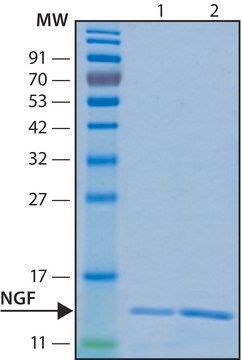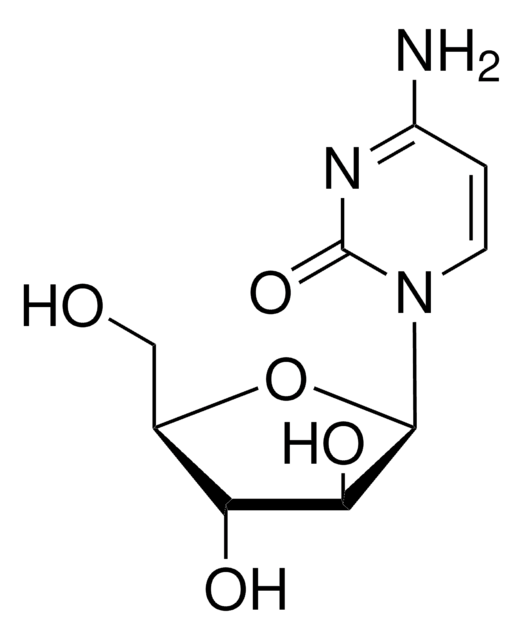Alle Fotos(1)
Wichtige Dokumente
N8133
Nerve Growth Factor from Vipera lebetina venom
lyophilized powder, suitable for cell culture
Anmeldenzur Ansicht organisationsspezifischer und vertraglich vereinbarter Preise
Alle Fotos(1)
About This Item
Empfohlene Produkte
Produktbezeichnung
Nerve Growth Factor from Vipera lebetina venom, NGF, lyophilized powder, suitable for cell culture
Biologische Quelle
Vipera Lebetina
Qualitätsniveau
Form
lyophilized powder
Wirksamkeit
0.2-20 μg/mL ED50/EC50
Qualität
endotoxin tested
Mol-Gew.
protein 32.5 kDa
Verpackung
pkg of 0.1 mg
Methode(n)
cell culture | mammalian: suitable
Verunreinigungen
<10 EU/vial
Farbe
white to off-white
UniProt-Hinterlegungsnummer
Lagertemp.
−20°C
Physikalische Form
Lyophilized from a 0.2 μm filtered solution in sodium acetate buffer.
Angaben zur Herstellung
Isolated from the snake venom of V. lebetina.
Hinweis zur Analyse
The biological activity of Nerve Growth Factor (NGF) from Vipera lebetina venom is measured in a cell proliferation assay using PC-12 cells.
Lagerklassenschlüssel
11 - Combustible Solids
WGK
WGK 3
Flammpunkt (°F)
Not applicable
Flammpunkt (°C)
Not applicable
Persönliche Schutzausrüstung
Eyeshields, Gloves, type N95 (US)
Hier finden Sie alle aktuellen Versionen:
Besitzen Sie dieses Produkt bereits?
In der Dokumentenbibliothek finden Sie die Dokumentation zu den Produkten, die Sie kürzlich erworben haben.
Kunden haben sich ebenfalls angesehen
Jeremy E Purvis et al.
Cell, 152(5), 945-956 (2013-03-05)
A growing number of studies are revealing that cells can send and receive information by controlling the temporal behavior (dynamics) of their signaling molecules. In this Review, we discuss what is known about the dynamics of various signaling networks and
Tao Yu et al.
The Journal of neuroscience : the official journal of the Society for Neuroscience, 34(17), 6098-6106 (2014-04-25)
Trk neurotrophin receptor ubiquitination in response to ligand activation regulates signaling, trafficking, and degradation of the receptors. However, the in vivo consequences of Trk ubiquitination remain to be addressed. We have developed a mouse model with a mutation in the
Federica De Angelis et al.
Journal of cellular physiology, 229(6), 783-790 (2013-10-30)
The peripheral application of the M2 cholinergic agonist arecaidine on sensory nerve endings shows anti-nociceptive properties. In this work, we analyze in vitro, the mechanisms downstream M2 receptor activation causing the analgesic effects, and in vivo the effects produced by
Yu-Jung Chang et al.
Biochimica et biophysica acta, 1830(8), 4130-4136 (2013-04-16)
Neurotrophins are important regulators for neural development and regeneration. Nerve growth factor (NGF) therapy has been tested in various models of neural injury and degeneration. However, whether NGF can reach target tissues and maintain effective concentration for a certain period
M Florencia Iulita et al.
Trends in pharmacological sciences, 35(7), 338-348 (2014-06-26)
Alzheimer's disease (AD) is a devastating neurodegenerative condition and the most common type of amnestic dementia in the elderly. Individuals with Down syndrome (DS) are at increased risk of developing AD in adulthood as a result of chromosome 21 trisomy
Unser Team von Wissenschaftlern verfügt über Erfahrung in allen Forschungsbereichen einschließlich Life Science, Materialwissenschaften, chemischer Synthese, Chromatographie, Analytik und vielen mehr..
Setzen Sie sich mit dem technischen Dienst in Verbindung.







